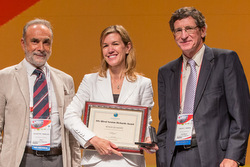
Chief of Nephrology Susan Quaggin, MD, stands with fellow International Society of Nephrology members Giuseppe Remuzzi, left, and David C. Harris after receiving the Alfred Newton Richards Award during the biennial World Congress of Nephrology meeting on June 2 in Hong Kong.
Susan Quaggin, MD, chief of the Division of Nephrology, Charles Horace Mayo Professor of Medicine, and director of the Cardiovascular Research Institute (FCVRI), has been awarded the Alfred Newton Richards Award from the International Society of Nephrology for basic science research in the field. The honor was presented June 2nd in Hong Kong during the World Congress of Nephrology, the leading biennial educational event in international nephrology.
“To be included on the same list as past Alfred Newton Richards Award winners is humbling, and to have the work of my lab placed among this group is truly an honor,” Quaggin said.
Established in 1987, the annual Alfred Newton Richards Award recognizes outstanding basic research related to nephrology. The award is named after the former chair of pharmacology at the University of Pennsylvania whose research provided some of the greatest advances in renal physiology during the 20th century. Richards was elected to the National Academy of Sciences (NAS) in 1927, received the Lasker Award in 1946, and later served as president of the NAS in 1947. Also early in his career he was appointed professor of pharmacology at Northwestern University’s medical school.
“This award highlights the enduring impact Sue has had on the field of nephrology,” said Eric G. Neilson, MD, vice president for medical affairs and Lewis Landsberg Dean. “I congratulate her on receiving this great honor.”
Throughout the past two decades, Quaggin’s research has contributed to the increased understanding of common kidney disease. In 1997, her lab discovered a gene that is vital for the development of healthy hearts, kidneys, and lungs. The gene is required for formation of specialized cells in the kidney that help form the filtration barrier responsible for removing excess fluid and waste from the blood, and prevent the loss of things the body needs, like protein.
A graduate of the Faculty of Medicine at the University of Toronto, Quaggin received her specialty degree in internal medicine in 1992. She completed subspecialty training in nephrology at the University of Toronto and did a post-doctoral fellowship at Yale University, where she studied the genetic basis of kidney development. In 1997, she returned to Toronto for a second post-doctoral fellowship in complex mouse genetics.
Throughout her career, Quaggin has chaired many international research meetings and review panels and is the rising program chair for the 2014 national meeting of the American Society of Nephrology. The recipient of the 2009 Medal for Excellence from the Kidney Foundation of Canada, she is also deputy editor of the Journal of the American Society of Nephrology, the leading kidney journal in the world, serves on the editorial boards of several other journals, and is a past councilor of the American Society for Clinical Investigation and an elected executive councilor of the International Society of Nephrology. Quaggin was also recently named to the Association of American Physicians.
Today, Quaggin’s goals remain lofty. She hopes to explore the possibility of growing an artificial kidney, and to that end she’s put together a working group inclusive of faculty in regenerative medicine, transplant surgery, and biomedical engineering.






